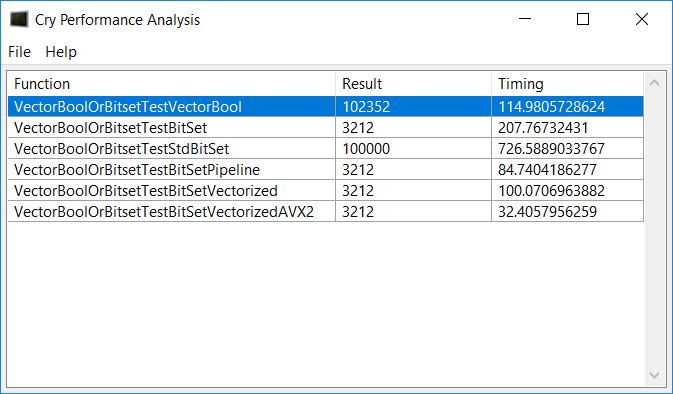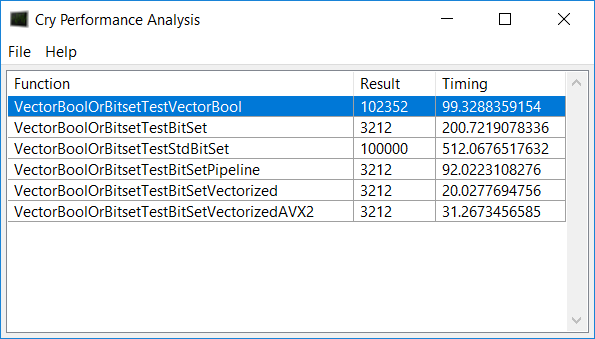Home » U++ Library support » U++ Core » Writing Bits object to disk
| Re: Writing Bits object to disk [message #47992 is a reply to message #47991] |
Tue, 02 May 2017 23:55   |
 |
 mirek
mirek
Messages: 13975
Registered: November 2005
|
Ultimate Member |
|
|
crydev wrote on Tue, 02 May 2017 22:54Hi Mirek,
I realized that my pipelined function was wrong. I made a silly mistake in the test case. The function is now fixed as:
// Testing pipelined version of Bits::Set(int, bool)
void Bits::PipelineSet(int i, const dword bs)
{
// Check whether i is within the bounds of the container.
ASSERT(i >= 0 && alloc >= 0);
// Get the DWORD index for the internal buffer.
int q = i >> 5;
// Get the bit index of the next available DWORD.
i &= 31;
// Do we need to expand the internal buffer first?
// Also check whether we can place 4 bits in the existing DWORD. If not, we should expand.
if(q >= alloc)
Expand(q);
// Get integer bit values according to existing DWORD value and indices.
// Assuming default value of bool is 0x1 if true!
const dword d1 = !!(bs & PowersOfTwo[0]) << i;
const dword d2 = !!(bs & PowersOfTwo[8]) << (i + 1);
const dword d3 = !!(bs & PowersOfTwo[16]) << (i + 2);
const dword d4 = !!(bs & PowersOfTwo[24]) << (i + 3);
bp[q] = (bp[q] | d1 | d2 | d3 | d4);
}
I did some more tests, and I am really surprised by the amount of difference the compiler and CPU make in this situation. I had to switch from my i7 2600k CPU to an Intel Core i7 4710MQ CPU because I was missing AVX2 (AVX2 really made it fast)  When compiled with the Visual C++ compiler, I got the following result. When compiled with the Visual C++ compiler, I got the following result.

I was surprised to see how the newer CPU runs the simple pipelined version a lot faster than the 2600k! I also saw that a vectorized version of the Set function is almost simpler than the regular one.  However, when I use the Intel C++ compiler, the results are very different: However, when I use the Intel C++ compiler, the results are very different:

It seems that the Intel compiler generates way different code, making the SSE2 version blazingly fast. 10 times faster than the regular Set function. The strange thing is, that when I use the Visual C++ compiler, the timing of the different test cases is as I expected them to be. I expected the AVX2 function to be faster than the SSE2 one, which clearly is not the case with the Intel compiler.
The sources of my vectorized functions is as following:
// Testing vectorized version of Bits::Set(int, bool)
// We require that the input bools have value 0x80, e.g. most significant byte set if true.
void Bits::VectorSet(int i, const unsigned char vec[16])
{
// Check whether i is within the bounds of the container.
ASSERT(i >= 0 && alloc >= 0);
// Get the DWORD index for the internal buffer.
int q = i >> 5;
// Do we need to expand the internal buffer first?
if(q >= alloc)
Expand(q);
// Get the bit index of the next available DWORD.
i &= 31;
// Create a bitmask with vector intrinsics.
__m128i boolVec = _mm_set_epi8(vec[15], vec[14], vec[13], vec[12], vec[11], vec[10], vec[9], vec[8]
, vec[7], vec[6], vec[5], vec[4], vec[3], vec[2], vec[1], vec[0]);
const int bitMask = _mm_movemask_epi8(boolVec);
// Set the resulting WORD.
LowHighDword w;
w.dw = bp[q];
if (i == 16)
{
w.w2 = (short)bitMask;
}
else
{
w.w1 = (short)bitMask;
}
bp[q] = w.dw;
}
// The same vectorized function, but with AVX2 instructions.
void Bits::VectorSetAVX2(int i, const unsigned char vec[32])
{
// Check whether i is within the bounds of the container.
ASSERT(i >= 0 && alloc >= 0);
// Get the DWORD index for the internal buffer.
int q = i >> 5;
// Do we need to expand the internal buffer first?
if(q >= alloc)
Expand(q);
// Get the bit index of the next available DWORD.
i &= 31;
// Create a bitmask with vector intrinsics.
__m256i boolVec = _mm256_set_epi8(vec[31], vec[30], vec[29], vec[28], vec[27], vec[26], vec[25], vec[24], vec[23]
, vec[22], vec[21], vec[20], vec[19], vec[18], vec[17], vec[16], vec[15], vec[14], vec[13], vec[12], vec[11]
, vec[10], vec[9], vec[8], vec[7], vec[6], vec[5], vec[4], vec[3], vec[2], vec[1], vec[0]);
const int bitMask = _mm256_movemask_epi8(boolVec);
// Set the resulting DWORD.
bp[q] = bitMask;
}
Is it feasible to make a vectorized version for U++ by default, or should I provide it for myself?
Thanks,
evo
I still think there is a glitch somewhere benchmarking this. Would it possible to post a whole package here?
Mirek
|
|
|
|
 |
|
Writing Bits object to disk
By: crydev on Wed, 11 January 2017 17:07 |
 |
|
Re: Writing Bits object to disk
By: mr_ped on Thu, 12 January 2017 01:20 |
 |
|
Re: Writing Bits object to disk
By: crydev on Thu, 12 January 2017 09:03 |
 |
|
Re: Writing Bits object to disk
By: mirek on Fri, 13 January 2017 08:39 |
 |
|
Re: Writing Bits object to disk
By: crydev on Wed, 18 January 2017 08:51 |
 |
|
Re: Writing Bits object to disk
By: crydev on Mon, 24 April 2017 19:19 |
 |
|
Re: Writing Bits object to disk
By: mirek on Mon, 24 April 2017 21:08 |
 |
|
Re: Writing Bits object to disk
By: crydev on Tue, 25 April 2017 09:36 |
 |
|
Re: Writing Bits object to disk
|
 |
|
Re: Writing Bits object to disk
By: mirek on Tue, 25 April 2017 10:31 |
 |
|
Re: Writing Bits object to disk
By: mirek on Tue, 25 April 2017 10:34 |
 |
|
Re: Writing Bits object to disk
By: crydev on Tue, 25 April 2017 11:37 |
 |
|
Re: Writing Bits object to disk
By: mirek on Tue, 25 April 2017 11:59 |
 |
|
Re: Writing Bits object to disk
By: mirek on Tue, 25 April 2017 12:38 |
 |
|
Re: Writing Bits object to disk
By: crydev on Tue, 25 April 2017 13:35 |
 |
|
Re: Writing Bits object to disk
By: mirek on Tue, 25 April 2017 13:39 |
 |
|
Re: Writing Bits object to disk
By: crydev on Tue, 25 April 2017 14:03 |
 |
|
Re: Writing Bits object to disk
By: mirek on Tue, 25 April 2017 16:40 |
 |
|
Re: Writing Bits object to disk
By: crydev on Wed, 26 April 2017 08:27 |
 |
|
Re: Writing Bits object to disk
By: crydev on Wed, 26 April 2017 08:50 |
 |
|
Re: Writing Bits object to disk
By: mirek on Wed, 26 April 2017 13:38 |
 |
|
Re: Writing Bits object to disk
By: crydev on Thu, 27 April 2017 10:31 |
 |
|
Re: Writing Bits object to disk
By: mirek on Thu, 27 April 2017 23:50 |
 |
|
Re: Writing Bits object to disk
By: crydev on Fri, 28 April 2017 19:04 |
 |
|
Re: Writing Bits object to disk
By: mirek on Sat, 29 April 2017 09:05 |
 |
|
Re: Writing Bits object to disk
By: omari on Fri, 28 April 2017 19:31 |
 |
|
Re: Writing Bits object to disk
By: mirek on Sat, 29 April 2017 09:53 |
 |
|
Re: Writing Bits object to disk
By: crydev on Tue, 02 May 2017 22:54 |
 |
|
Re: Writing Bits object to disk
By: mirek on Tue, 02 May 2017 23:55 |
 |
|
Re: Writing Bits object to disk
By: crydev on Wed, 03 May 2017 09:00 |
 |
|
Re: Writing Bits object to disk
By: mirek on Wed, 03 May 2017 09:53 |
 |
|
Re: Writing Bits object to disk
By: crydev on Wed, 03 May 2017 11:12 |
 |
|
Re: Writing Bits object to disk
By: mirek on Wed, 03 May 2017 11:27 |
 |
|
Re: Writing Bits object to disk
By: crydev on Wed, 03 May 2017 12:24 |
 |
|
Re: Writing Bits object to disk
By: mirek on Wed, 03 May 2017 12:37 |
 |
|
Re: Writing Bits object to disk
By: crydev on Wed, 03 May 2017 18:33 |
 |
|
Re: Writing Bits object to disk
By: crydev on Sat, 06 May 2017 10:28 |
 |
|
Re: Writing Bits object to disk
By: crydev on Tue, 16 May 2017 09:12 |
 |
|
Re: Writing Bits object to disk
By: mirek on Tue, 16 May 2017 10:39 |
 |
|
Re: Writing Bits object to disk
By: mirek on Tue, 16 May 2017 13:12 |
 |
|
Re: Writing Bits object to disk
By: crydev on Tue, 16 May 2017 20:17 |
Goto Forum:
Current Time: Fri May 03 22:10:23 CEST 2024
Total time taken to generate the page: 0.02374 seconds
|
